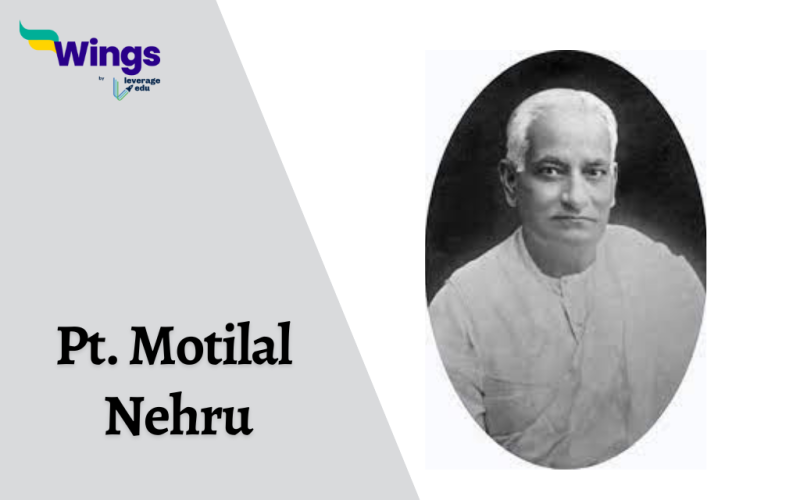Motilal Nehru was a visionary leader, lawyer, political activist and one of the pioneers in India’s freedom struggle. He was born on May 6, 1861, in Agra, British India (presently Uttar Pradesh). Motilal Nehru advocated for various reforms and worked to promote women’s rights and education too. He dedicated his life to fighting for India’s Independence and remained committed to being a nationalist at heart. In this blog, we will delve into the life of Motilal Nehru and his contributions.
What was the Early Life and Education of Motilal Nehru?
Pandit Motilal Nehru hailed from a renowned Kashmiri Brahmin Family. His father’s name was Gangadhar Nehru who was a prominent lawyer in Allahabad and his mother’s name was Srimati Jeorani. Motilal Nehru received his early education at home, where he imbibed a passion for learning and a deep sense of justice from his father.
Later, Motilal Nehru attended the Muir Central College in Allahabad, where he excelled in academics and actively participated in extracurricular activities. He was one of the First Indians to have passed the honourable Indian Civil Service (ICS) examination in 1882, but he being a democrat chose not to be in service, rather fought for the cause and became a lawyer (Vakil) in 1883. He was married to Swarup Rani with whom he had one son, Jawaharlal Nehru, who later went on to become the Prime Minister of Independent India and two daughters.
Also Read – Popular Struggles and Movements
Legal Career
Motilal Nehru became a lawyer in Kanpur, but three years later shifted to Allahabad. He established a successful legal practice in Allahabad with his own firm known as Nehru & Co. Known for his eloquence, he gained a reputation for being a skilful advocate and a fierce defender of justice.
His brilliance as a lawyer catapulted him to the position at the Allahabad Bar Association in 1896. Motilal Nehru’s legal acumen and commitment to justice led him to take up many high-profile cases, fighting against social injustices and championing the cause of the marginalised. In the year, 1905, he was appointed as a member of the Imperial Legislative Council which was the highest law-making body at that time in British India.
Also Read – Quit India Movement: History, Facts, Phases, UPSC
What was the Political Journey of Motilal Nehru?
Motilal Nehru’s political journey started with him joining the Indian National Congress (INC). It was a nationalist organization that aimed to free India from British rule.
- He was the president of the Allahabad branch of the Home Rule League which was started by Annie Besant, but parted his ways in 1918.
- It was after the holocaust of Jallianwala Bagh in 1919, that for the first time, Motilal Nehru presided over as the President of the Amritsar Congrees in December of the same year. And again in the year 1928 at the Calcutta Session.
- Influenced by Gandhiji, he worked closely with him. He actively participated in various political activities, demanding self-governance, promoting Swadeshi (boycott of foreign goods), and advocating for the rights of Indians. He joined the Non-cooperation movement and was the only front high-ranking leader to support the movement in the Special Congress at Calcutta in the year 1920.
- Because of his involvement in the movement, he was arrested and sent to jail for six months with his son Jawaharlal Nehru.
- When he came out of jail in 1922, he found that the mass movement had failed and hence he parted ways to form his new party.
- In collaboration with C.R. Das, Nehru founded the Swaraj Party in 1923.
- After the Legislative Assembly election of 1923, he served as the Leader of the Opposition for the next six years.
- But in the year 1927, when the Simmon Commission was appointed, Dr Ansari, the then Congress President convened an All-Parties Conference which was headed by Motilal Nehru.
- Subsequently, in 1928, he submitted a report to determine the principles of the constitution for free India. The report came to be known as the Nehru Report.
- He resigned from active political participation in the year 1929.
- But in the year 1930, Nehru again was a participant in the Civil Disobedience Movement which was related to the Salt Satyagraha and was arrested.
- After his release, he suffered from ill-health.
- He took his last breath on 6th January 1931.
Motilal Nehru was an avid photographer and was a patron of arts. He supported Indian artists and he himself was a polyglot who knew languages like Hindi, English, Urdu, Arabic and Persian. In the year 1919, he launched a new newspaper named – “The Independent” and contributed to raising his voice on various topics including the empowerment of women through it.
Relevant Blogs
| Lord Lansdowne | Lord Irwin |
| Indira Gandhi | Lord Chelmsford |
| The Government of India Act 1919 | Kiran Bedi |
| Hunter Commission | Gandhi Irwin Pact (1931) |
| Bengal Partition | Birsa Munda |
We hope you liked our blog. If you want to read more articles like this you can visit our general knowledge page on Indian History!
 One app for all your study abroad needs
One app for all your study abroad needs













